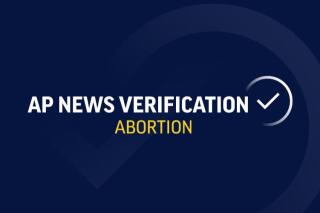California Prop 1 wouldn’t legalize abortion until ‘moment of birth’

CLAIM: California’s Proposition 1 will change the state’s constitution to allow taxpayer-funded abortions up to the moment of birth, regardless of the health of the mother.
AP’S ASSESSMENT: Missing context. Existing state-subsidized health programs cover abortion services for qualifying patients and these would not be modified by Proposition 1. The amendment does not mention prohibiting or allowing abortions late in pregnancy. But state law already restricts third-trimester abortions, and California legal experts told The Associated Press they don’t expect courts would interpret the amendment as expressly permitting them.
THE FACTS: Next week, California voters will decide whether to approve Proposition 1, a measure proposed after the repeal of Roe v. Wade that would amend the state constitution to guarantee access to abortion procedures and birth control. But misleading claims about what the ballot measure would do if it passes have been circulating on social media.
“Proposition 1 is seeking to change California’s constitution to allow abortion up until the point of birth for any reason at all, even if the mother’s life isn’t at risk,” a video circulating on Instagram claims. “And to make things worse, they want taxpayers’ dollars to pay for these abortions.” That clip had received more than 21,000 likes as of Wednesday.
In another Instagram video, with more than 5,000 likes, a person alleges that Proposition 1 “would change California’s constitution to include late-term abortion up to the very moment of birth, even if the baby’s healthy, even if the mother’s health is not at risk.” The person repeats the claim that such abortions would be taxpayer-funded.
The amendment language put forward by Proposition 1 does not spell out which, if any, types of abortions would still be prohibited. But the courts wouldn’t interpret the amendment as an “absolute right” to any abortion in any circumstance, as they would still take existing law into account, said Kimberly West-Faulcon, a constitutional law professor at Loyola Law School in Los Angeles.
California already prohibits most abortions after fetal viability, defined in state law as the point during a pregnancy at which there is “a reasonable likelihood of the fetus’ sustained survival outside the uterus.” Abortions after this point are now illegal unless the mother’s health or life is at risk.
“These horrible hypotheticals just are not accurate, because the behavior being described, if someone engaged in it, I think would be criminal. And for many reasons, I think the California Supreme Court would deem it criminal, too,” she said.
Mary Ziegler, a professor who studies reproductive rights and health care law at the University of California, Davis law school, gave a similar assessment.
The amendment “doesn’t say the word ‘viability,’ so there’s no crystal clear thing saying you can 100% constitutionally ban abortion after viability,” Ziegler said. “But to go from that to, ‘and therefore, you can have an abortion until the moment of birth,’ is just, I think, a misreading of how constitutional rights usually work.”
Abortions that occur late in pregnancy are very rare and typically are performed if the fetus has a low probability of survival. By the time a woman is in labor, the decision has been made to give birth, medical experts have previously told the AP.
There are already California health programs that use taxpayer funding to cover abortion services. One such program is Medi-Cal, the state Medicaid program, which provides health coverage to eligible low-income residents. Luke Koushmaro, a senior fiscal and policy analyst at the state’s independent Legislative Analyst’s Office, said that Medi-Cal would continue providing coverage for abortions whether or not Proposition 1 passes.
The Legislative Analyst’s Office conducted a nonpartisan analysis of the ballot measure and found that it would have “no direct fiscal effect” on the state budget. The analyst’s office also noted in its analysis that how a court might interpret the proposition to expand reproductive rights beyond existing law is unclear in the ballot measure.
A few other states, including Michigan and Vermont, have ballot measures addressing abortion in the midterms. They come in the aftermath of the Supreme Court ruling in June that overturned Roe, leaving the question of abortion rights up to the states.
___
This is part of AP’s effort to address widely shared misinformation, including work with outside companies and organizations to add factual context to misleading content that is circulating online. Learn more about fact-checking at the AP.


